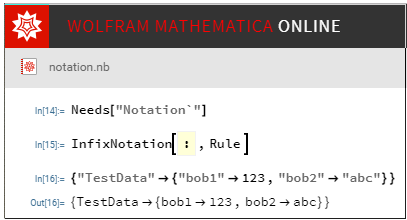I am trying to get an APIFunction to send valid JSON. This is my demo function.
CloudDeploy[
APIFunction[{"y" -> "Number"},
ExportString[{"TestData" -> {"bob1" -> #y, "bob2" -> "abc"}},
"JSON", "Compact" -> True] &], "EPCtest3",
Permissions -> "Public"]
Run from a URL, e.g."www.wolfram. ... /EPCtest3?y=123" produces this
"{\"TestData\":{\"bob1\":123,\"bob2\":\"abc\"}}"
However, this JSON validator says it is invalid. It is ok if formatted like so:
{"TestData":{"bob1":123,"bob2":"abc"}}
The receiving code is expecting JSON, e.g.
var documentResponse = await apiResponse.Content.ReadAsStringAsync();
dynamic response = JsonConvert.DeserializeObject(documentResponse);
I can output valid JSON in regular Mathematica using the Notation package, (not ideal though). However, that doesn't work from the cloud.
Needs["Notation`"]
InfixNotation[ParsedBoxWrapper[":"], Rule ]
{"TestData" -> {"bob1" -> 123, "bob2" -> "abc"}}
{"TestData" : {"bob1" : 123, "bob2" : "abc"}}
E.g. Doesn't work on the cloud.
Any help on sending JSON from the APIFunction appreciated.


"String"as result type for theAPIFunction, as inAPIFunction[{"y" -> "Number"}, ExportString[...] &, "String"]. Otherwise you will get the input-form like representation of the resulting string $\endgroup$